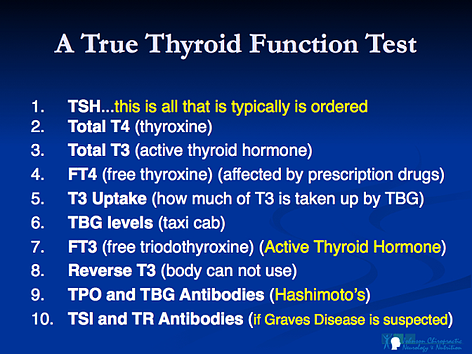What do you do when you have symptoms of hypothyroidism, but your doctor says your thyroid levels are normal? You may have one of three lesser known causes of this frustrating condition.
symptoms of hypothyroidism, but your doctor says your thyroid levels are normal? You may have one of three lesser known causes of this frustrating condition.
If you are like many of the patients who I work with to track down the elusive culprit, your many symptoms are often treated with medications. Some of the most common hypothyroid symptoms are:
- Fatigue
- Weakness
- Weight gain or increased difficulty losing weight
- Difficulty swallowing
- Coarse, dry hair
- Dry, rough pale skin
- Thinning hair on scalp/hair loss
- Loss of body hair
- Cold intolerance (you can't tolerate cold temperatures like those around you)
- Muscle cramps and frequent muscle aches
- High Cholesterol
- Constipation
- Depression
- Irritability
- Memory loss
- Inability to concentrate
- Abnormal menstrual cycles/Heavy period
- Infertility
- Decreased libido
Three lesser known causes of hypothyroidism are:
- High Prolactin levels
- Anemias
- Altered levels of Thyroxin Binding Globulin (TBG)
Let's take a look at all three because one key to having vibrant health depends on proper thyroid activity in the body.
High Prolactin Levels
Prolactin is a hormone that's made by your pituitary gland. High levels of prolactin suppress TSH or Thyroid-Stimulating Hormone. Prolactin is balanced by the hormone, progesterone and the one of the nerve communication chemicals called dopamine.
When someeone has a dopamine deficiency, or progesterone deficiency, their prolactin will increase, and that will decrease the function of the pituitary's production of thyroid-stimulating hormone.
If you are lucky this imbalance will show be respresentin in your blood labs, as the TSH being in a lower, but not quite out of the reference range. This is why it's important to
know that there are "optimal" or "functional" levels.
Prolactin also suppresses luteinizing hormone (LH) in women. Excess prolactin can cause infertility. In men, excess prolactin depresses testosterone so they have low libido. High prolactin can cause tumors that are called prolactinomas as well.
The bottom line is that excess levels of prolactin, whether caused either by a tumor or some other problem, can suppress your thyroid function.
Anemias
In other posts, I've explained that the number-one cause of hypothyroidism is an autoimmune thyroid, but the question I get is, "What if the patient isn't autoimmune?"
For a smaller number of people who have hypothyroidism, their hypothyroid symptoms are due to having an anemia of one type or another. "Anemia is the most common blood disorder, and according to the National Heart, Lung, and Blood Institute, it affects more than 3 million Americans. Anemia occurs when you do not have enough red blood cells or when your red blood cells do not function properly." [1]
"Many people are at risk for anemia because of poor diet, intestinal disorders, chronic diseases, infections, and other conditions. Women who are menstruating or pregnant and people with chronic medical conditions are most at risk for this disease. The risk of anemia increases as people grow older. People who engage in vigorous athletic activities, such as jogging or basketball, may develop anemia as a result of red blood cells breaking down in the bloodstream." [1]
If you have any type of anemia, attempts to help other conditions will be thwarted, or ineffective, since anemia literally starves your body of oxygen.
Oxygen is very important in healing your body. Your brain and nervous system need two things to survive: fuel and activation. Fuel comes in the form of oxygen and glucose (recently I explanied why low thyroid symptoms can be affected by blood sugar (glucose) levels). When you deprive your body of oxygen, you deprive your red blood cells (RBCs) of oxygen. The basic function of the RBCs is to maintain, regenerate, and heal the body. With RBC's functioning at less than optimal levels, the body simply cannot operate adequately!
It is vital that the clinician address the anemic patient. Anemia can be due to a variety of reasons and factors, including B12 anemia or pernicious anemia, which is another autoimmune disease. Some forms of anemia don't seem to respond to iron supplements because the red blood cells break down. So when this happens, supplementing won't increase iron levels and can, in fact, make the problem much worse. Too much iron in the body is much more
toxic than mercury, lead or other heavy metals.
A huge key to solving tough non-autoimmune cases is to look at the five body chemistry imbalance priorities. The five priorities are:
- Anemia
- Blood sugar or glucose imbalance
- Gut function abnormalities
- Liver malfunction
- Fatty acid metabolism abnormalities
Altered Levels of Thyroxine Binding Globulin
When thyroid hormones are secreted from your thyroid gland, they are attached to a carrier, a protein taxicab. This protein is called "thyroxine-binding globulin" or TBG. So TBG is similar to a taxicab, and your thyroid hormones, T4 and T3, get into the cab, and are transported to the cells of the body where they are needed. For example TBG escorts T4 hormone to the liver, where it is converted to T3 hormone.
The thyroid hormones then "jump back into the cab" and they're transported to the rest of the body where they exert their effects. You have this little carrier going anywhere and everywhere inside your body. Trouble occurs when there are so many of these TBG carrier proteins taxicabs, that the normal free amount of T4 and T3 that should be floating free in the blood, waiting for a taxi are all in the taxicabs. It's as if they all get sucked up by this big sponge, by all these little taxicabs, these thyroid-binding globulins and now the free hormones can't exert their effects on cells as they are meant to. In essence, the taxi's (TGB) are so numerous, they don't want to let their fare go (T4 & T3) for fear there won't be another to replace the ones they release.
On a blood test your TSH will look normal; your total T4 will look normal; your total T3 will look normal. If those are the only markers your doctor is checking, then the problem is completely missed. This is why you need ALL of the thyroid testing done, just not TSH, T3 and T4. You need TSH, Resin T3 Uptake, free thyroxine index, reverse T3, and the thyroid antibodies, in addition to the TBG thyroxine-binding globulin, Free T3, Free T4, and Total T4. If
your TBG is too high, even though your TSH is normal, including T4 and total T3, your doctor needs to check your T3 Uptake. It will show that, actually, the T3 Uptake is low when the thyroid-binding globulin, or TBGs, are high.

Remember that the lab reference range of T3 uptake is extremely broad, where the optimal or functional range is much narrower.
Excess estrogen can elevate TBG. Birth control pills contain estrogens. Some face creams and cosmetics contain undisclosed estrogens. And these estrogens can elevate in your body and they're detoxified through the liver. If you have poor liver function, or inability to detoxify, this is yet another reason you could still have thyroid-type symptoms. It's not necessarily a thyroid gland problem, but it's more of a liver problem.
It's important to realize that there can be many more causes of thyroid malfunction! More than just, "My TSH is low." My approach is to perform a thorough exam with the proper breadth and depth of testing to get to the root cause of what's happening with each patient.
If thyroxine-binding globulin (TBG) is high, you could have low thyroid symptoms, but normal lab numbers, even though you are currently taking thyroid medication.
If you found value in this article, please use the social sharing icons at the top of this post and please share with those you know who are still suffering with low thyroid symptoms or other chronic health challenges, despite receiving medical managment. Help me reach more people so they may regain their zest for living! Thank you!
All the best – Dr. Karl R.O.S. Johnson, DC – Digging Deeper To Find Solutions
1. http://www.hematology.org/patients/blood-disorders/anemia/5225.aspx



